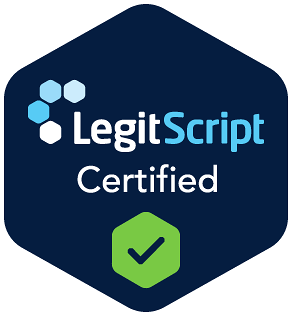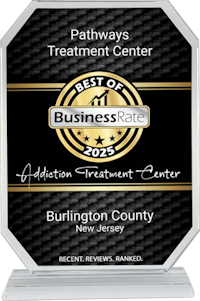Addiction Therapy Services
in Burlington, New Jersey
Addiction therapy is a crucial component of the journey to recovery for those battling substance use disorders. It helps individuals uncover the underlying causes of their addiction, adopt healthy coping strategies, and establish a strong support system.
At Pathways Recovery Center, we provide a wide range of addiction treatment services tailored to meet the unique needs of our clients. Recognizing that each person’s experience with addiction is different, our diverse team of professionals is equipped with a variety of therapeutic approaches to support each individual’s path to recovery.
Therapy plays a pivotal role in the healing process. It can provide a safe space for processing past trauma, or for learning how to cope with co-occurring mental illness. It is often crucial for determining how to live with an addiction long-term.

Addiction therapy delves deep into the root causes that drive addictive behaviors such as trauma, mental health disorders, or unresolved emotional pain. Through various therapeutic techniques, addiction therapy helps individuals uncover and address these core problems. This process is crucial for long-term recovery, as it enables individuals to understand and manage the triggers that lead to substance abuse.
Addiction therapy often takes a holistic approach, recognizing the impact of addiction on every aspect of an individual’s life. This involves treating the mind, body, and spirit to promote overall well-being. Therapy modalities like cognitive-behavioral therapy (CBT), mindfulness meditation, yoga, and nutritional counseling are integrated into treatment plans. By addressing the physical, emotional, and spiritual needs, holistic healing fosters a comprehensive and enduring recovery process.
Not everyone knows how to cope with a mental illness, and the prospect of dealing with a dial diagnosis can be intimidating. Addiction-focused therapy targets this, especially in targeted programs like sober living environments. These structured, substance-free spaces provide a supportive community and accountability, as well as a community of people also taking on similar challenges. They help individuals transition from intensive treatment to everyday life, building the skills and resilience needed to maintain sobriety amidst daily challenges.
By integrating these elements, addiction therapy offers a comprehensive path to long-term wellness and a healthier, substance-free life.
What are the Types of Addiction Therapy?
Not every type of therapy works for everyone who needs addiction treatment. Individuals involved in addiction therapy often undergo many different types, especially if they have a dual diagnosis.
Here are the most common types of addiction therapy services offered:
Behavioral therapies are evidence-based treatments designed to help individuals overcome substance use disorders by addressing the psychological and behavioral aspects of addiction. These therapies aim to change maladaptive behaviors and thought patterns, develop coping strategies, and enhance motivation for recovery. These can include:
- Cognitive Behavioral Therapy (CBT): Individuals identify and alter negative thoughts and behaviors, fostering healthier coping mechanisms and problem-solving skills.
- Dialectical Behavior Therapy (DBT): This teaches emotional regulation, distress tolerance, interpersonal effectiveness, and mindfulness for managing addiction.
- Contingency Management: Often used in addition to other techniques, this uses positive reinforcement (such as rewards) to encourage treatment goals and sobriety.
- Motivational Interviewing (MI): This technique enhances motivation to change by resolving ambivalence about quitting substance use.
These therapies are often integrated into comprehensive treatment plans that may also include medical interventions, support groups, and other therapeutic approaches.
Group therapies are structured treatment approaches where individuals with substance use disorders come together to support each other’s recovery. These therapies leverage the power of peer interaction and shared experiences to foster a sense of community, reduce feelings of isolation, and promote mutual support.
Popular types of group therapies for addiction include:
- Support Groups: This is a safe environment for sharing experiences, challenges, and successes, offering mutual support and encouragement in recovery.
- 12-Step Programs: Structured programs like AA can focus on personal and spiritual growth through peer support and adherence to the 12 steps.
- Family Therapy Groups: This structure involves family members to improve communication, address dysfunctional dynamics, and strengthen the support system.
- Psychoeducational Groups: Individuals receive education about addiction, coping strategies, and relapse prevention so they can better understand and manage their condition.
- Skills Development Groups: Each group teaches practical skills such as stress management, emotional regulation, and problem-solving to support sobriety and daily life challenges.
These group therapies help to create a supportive network that enhances individual motivation, provides accountability, and fosters a sense of belonging, which are crucial elements in the recovery process.
Holistic therapies for addiction are treatment approaches that address the physical, emotional, mental, and spiritual aspects of an individual’s well-being. These therapies aim to treat the whole person rather than just the symptoms of addiction.
Examples of holistic therapies for addiction include:
- Yoga and Meditation: These focus on physical and mental well-being through relaxation techniques and mindfulness.
- Art and Music Therapy: Individuals use creative expression as a therapeutic outlet to process emotions and reduce stress.
- Nutritional Therapy: This overarching program focuses on restoring physical health through a balanced diet, vitamins, and supplements to support recovery and overall well-being.
- Equine Therapy: Individuals interact with horses to promote emotional healing and personal growth.
Holistic therapies complement traditional treatments and can enhance the overall effectiveness of an addiction recovery program by promoting a balanced and healthy lifestyle.

Programs for Addiction Therapy
Residential treatment programs are intensive, live-in care facilities designed to provide a structured and supportive environment for individuals seeking to overcome substance use disorders. These programs offer comprehensive treatment that typically includes a combination of medical care, counseling, and various therapeutic modalities.
Outpatient treatment programs offer flexible, non-residential options for addiction recovery while allowing individuals to maintain daily responsibilities. These programs include Intensive Outpatient Programs (IOPs), offering comprehensive treatment while living at home. Other options include Partial Hospitalization Programs (PHPs), which provide high-level care while allowing the individual to return home at night.
Relapse prevention programs are structured programs designed to help individuals maintain sobriety and avoid returning to substance use after completing initial treatment. These programs focus on equipping individuals with the skills and strategies necessary to manage triggers, cope with stress, and sustain long-term recovery.
Addiction Therapy For Dual Diagnosis
Dual diagnosis, where mental health disorders and substance use disorders occur together, presents unique treatment challenges that require a comprehensive and coordinated approach. This integrated treatment method addresses both conditions simultaneously, ensuring holistic and effective healing.
A key component of dual diagnosis treatment is medication-assisted treatment (MAT). MAT combines FDA-approved medications with counseling and behavioral therapies to treat substance use disorders and help sustain recovery. This approach is particularly beneficial for individuals with a dual diagnosis, as it can stabilize mental health symptoms while reducing cravings and withdrawal symptoms.
By incorporating MAT, a balanced and evidence-based approach enhances the overall effectiveness of treatment. Medications such as buprenorphine, methadone, and naltrexone are carefully prescribed and monitored to support recovery, allowing patients to focus on their therapeutic journey. Alongside MAT, comprehensive programs include individual and group therapy, holistic treatments, and family support, ensuring that every aspect of a patient’s well-being is addressed for long-term recovery success.

What are the Benefits of Therapy for Substance Abuse?
Therapy for substance use offers numerous benefits that extend beyond just stopping substance use. Here are some of the key advantages:
- Identifying Triggers: Therapy helps recognize underlying causes like trauma or mental health disorders.
- Developing Coping Mechanisms: As part of a program, therapy provides healthier ways to deal with triggers and manage emotions.
- Improving Communication Skills: On individual and group levels, therapy can enhance family and group interactions.
- Establishing Support Networks: Specialized therapy connects individuals with supportive peers.
- Developing Relapse Prevention Strategies: Undergoing therapy helps an individual identify their own signs and plan out strategies to avoid relapse.
- Ongoing Support: Therapy provides continuous support and accountability.
- Promoting Self-awareness: Undergoing individual and group therapy encourages self-reflection and understanding.
- Setting and Achieving Goals: Working with a therapist helps set realistic recovery goals.
- Encouraging Healthy Lifestyle Choices: Lessons from therapy can help promote better nutrition and exercise.
- Reducing Health Risks: Addiction therapy can lower the risks of diseases related to substance abuse.
Therapy for substance use not only aids in achieving sobriety but also can enhance mental, physical, and financial well-being, leading to a better quality of life.
Take the First Step Towards
Healing at Pathways Treatment Center
Are you or a loved one struggling with addiction? It’s time to get help today and embrace a brighter future. At Pathways Treatment Center, we offer compassionate support to help you overcome addiction and achieve lasting recovery. Whether you’re facing substance abuse, alcohol dependency, or other addictions, we’re here to guide you every step of the way.
Reach out to us today and take the first step on your journey to healing and recovery. Your new beginning starts here.



